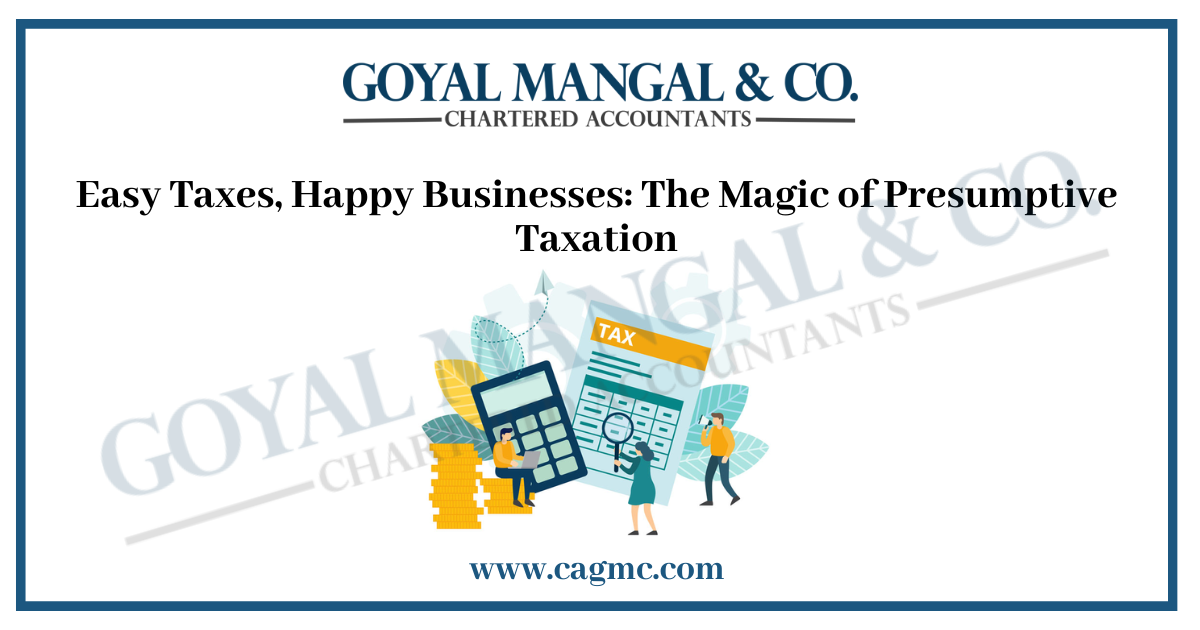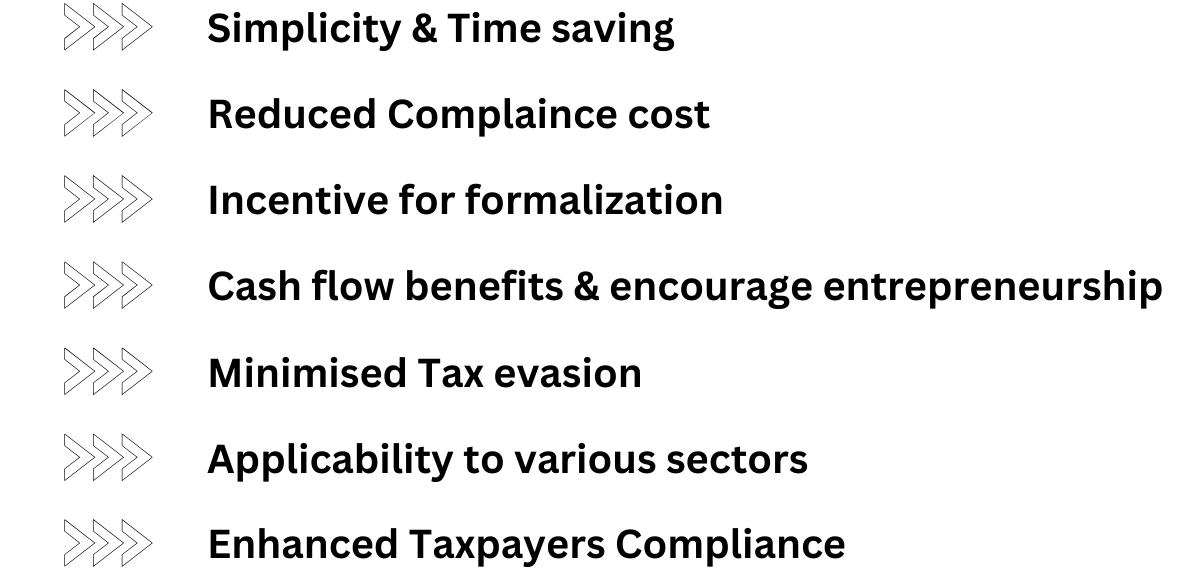
In the world of taxes, simplicity is often a treasure. For small businesses and taxpayers, Presumptive Taxation Scheme under Section 44ADA brings a breath of fresh air, making the tax process much more straightforward. This blog explores the concept of presumptive taxation, focusing on how it eases the burden for small-scale entrepreneurs. Let’s get to know about the simplicity and benefits that come with this approach, providing a smoother tax experience for those who might find tax procedures challenging.
Meaning of presumptive taxation system
Presumptive taxation is like a simplified way of calculating taxes, especially designed for small businesses or individual taxpayers. Instead of going through detailed and complex accounting processes, presumptive taxation allows you to estimate your income and pay taxes based on that estimate. There is no need to keep or audit of books of accounts. Governs sections 44AD, 44ADA and 44AE of the Income Tax Act 1961. Presumptive taxation allows the taxpayer to declare income at a specified rate.
Advantages of Presumptive Taxation Scheme
The advantages of Presumptive Taxation Scheme:
- Simplicity: Presumptive taxation simplifies the tax process by offering a straightforward method for small businesses to calculate their taxes. It reduces the burden of complex record-keeping and accounting.
- Timesaving: Businesses under presumptive taxation save time that would otherwise be spent on meticulous documentation and compliance. This allows entrepreneurs to focus more on their core business activities.
- Reduced Compliance Costs: Since the tax is based on presumptions rather than actual profits, businesses may experience lower compliance costs associated with extensive record-keeping and hiring professional accountants.
- Incentive for Formalization: Presumptive taxation can serve as an incentive for informal or small businesses to formalize their operations, as the simplified tax structure makes it easier for them to enter the formal economy.
- Cash Flow Benefits: For businesses facing fluctuations in income, presumptive taxation provides stability by taxing a predetermined percentage of their turnover, allowing for better cash flow management.
- Encourages Entrepreneurship: By reducing the administrative and financial burdens on small businesses, presumptive taxation fosters entrepreneurship and helps new ventures get off the ground more easily.
- Applicability to Various Sectors: This tax approach is adaptable and can be applied across various sectors, making it inclusive and relevant for a wide range of businesses, including those in the service industry.
- Minimized Tax Evasion: The simplicity of presumptive taxation reduces the likelihood of tax evasion, as there are fewer complexities and loopholes for businesses to exploit.
- Cost-Effective for Tax Administration: Tax authorities benefit from presumptive taxation as it streamlines the assessment process, making it more cost-effective for tax administration.
- Enhanced Taxpayer Compliance: The straightforward nature of presumptive taxation can enhance taxpayer compliance, as businesses find it easier to understand and fulfil their tax obligations, leading to a more cooperative relationship with tax authorities.

Presumptive Taxation Scheme u/s 44AD?
The Presumptive Taxation Scheme under Section 44ADA allows small businesses to state their earnings based on a proportion of their overall sales revenue.
An eligible person under section 44AD of Income Tax Act:
- Someone who is a resident, but not a limited liability partnership firm according to the Limited Liability Partnership Act of 2008, and can be an individual, a Hindu undivided family, or a partnership firm.
- Who hasn’t utilized any deductions specified in sections 10A, 10AA, 10B, or 10BA or any provisions in Chapter VIA under the mentioned category
- The scheme can only be utilized by someone who is a resident, an individual, a Hindu Undivided Family (HUF), or a Partnership Firm (excluding Limited Liability Partnership Firm).
- Any business, can adopt 44AD scheme excluding the business of plying, hiring, or releasing goods carriage mentioned in section 44AE.
- The business is eligible for Scheme 44AD when If the total turnover or gross receipts in the preceding year do not surpass an amount of two crore rupees (increased to three crore rupees by the Finance Act of 2023 with effect from 1-4-2024), the cash received during the previous year cannot exceed 5 percent of the total turnover or gross receipts.
Person not eligible for Presumptive Taxation
Presumptive Taxation Scheme under Section 44AD is a simplified method for calculating taxes, mainly designed to help small businesses that is presumptive taxation for business. However, there are certain individuals who are not eligible for this simplified approach. If you have a business involving agency, commission, brokerage, or any profession with specialized skills, you might not qualify for presumptive taxation. In simpler terms, if your work falls into these categories, you may need to follow the regular tax calculation methods instead of the simplified presumptive taxation rules. The presumptive taxation limit changes with government notification.
Income computation under Sec 44AD
- The total income of the eligible business will be considered as 8% of its turnover or gross receipts.
- To encourage electronic transactions, income will be calculated at a rate of 6% of the total money received through account payee checks, account payee bank drafts, or electronic clearing systems via a bank account in the previous year or prior to the income tax filing deadline.
- No additional reduction will be permitted based on the guidelines outlined in sections 30 to 38.
- The written down value of any eligible business asset will be regarded as having been determined as if the qualifying taxpayer had requested and been granted the deduction for depreciation for each applicable assessment year.
Presumptive Taxation Scheme under Section 44ADA
To qualify for Presumptive Taxation Scheme under Section 44ADA, the taxpayer must:
- Be an individual or a partnership other than a limited liability partnership within the meaning of clause (n) of subsection (1) of Section 2 of the Partnership is Act with Limited Liability Company, 2008 (6 of 2009),
- Taxpayer should be a resident of India and
- The gross income of the person engaged in profession specified in Subsection (1) of Section 44AA should not exceed 50 lakhs rupees.
A taxpayer who declares that his income and income from his professional activity is less than the income and income referred to in subsection (1) of Section 44AA and whose total income exceeds the maximum amount exempt from income tax is obliged to keep and maintain such books accounts and other documents, as required by subsection (1) of section 44AA and to provide a report on that examination in accordance with section 44AB.
Computation of Income under section 44ADA
If an individual chooses to utilize the guidelines outlined in section 44ADA, that is presumptive taxation for professionals their income will be calculated based on a presumptive basis.
- Income will be on presumptive bases and will be set at 50% of the entirety of their professional earnings. On the other hand, an individual has the ability to report earnings higher than 50%.
- Any deduction that falls within the guidelines of sections 30 to 38 of the Income Tax Act, 1961 will be considered as already having been fully taken effect and no additional deductions can be made using those sections.
- The recorded worth of any asset utilized for professional purposes will be considered as calculated if the taxpayer had requested and been granted the deduction for depreciation in each of the applicable assessment years.
Presumptive taxation scheme 44AE
Any taxpayer who possesses a maximum of ten goods carriages at any point in the previous year and is involved in the trade of operating, renting, or leasing these goods carriages. In case the assessee opts for flat tax regime under section 44AE, the income will be computed on estimated basis.
1000/- per ton gross weight of the vehicle for each month or part of a month that the heavy vehicle is in the possession of the taxpayer. In respect of vehicles other than heavy goods vehicles, the income will be computed at the rate of Rs.7,500/- for each month or part of a month in which the taxpayer incurs freight charges. Part of a month will be considered a full month.
Conclusion
In conclusion, presumptive taxation emerges as a boon for small taxpayers, offering a hassle-free way to fulfil their tax obligations. The ease of calculation and reduced compliance requirements make it an attractive option for those with modest business operations. As we get to know the landscape of taxation, embracing presumptive taxation is like finding a reliable compass for small businesses – guiding them through the complexities with simplicity and ease.


